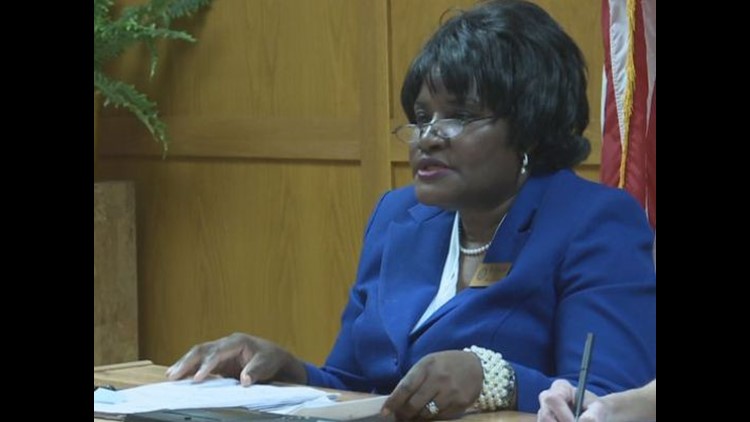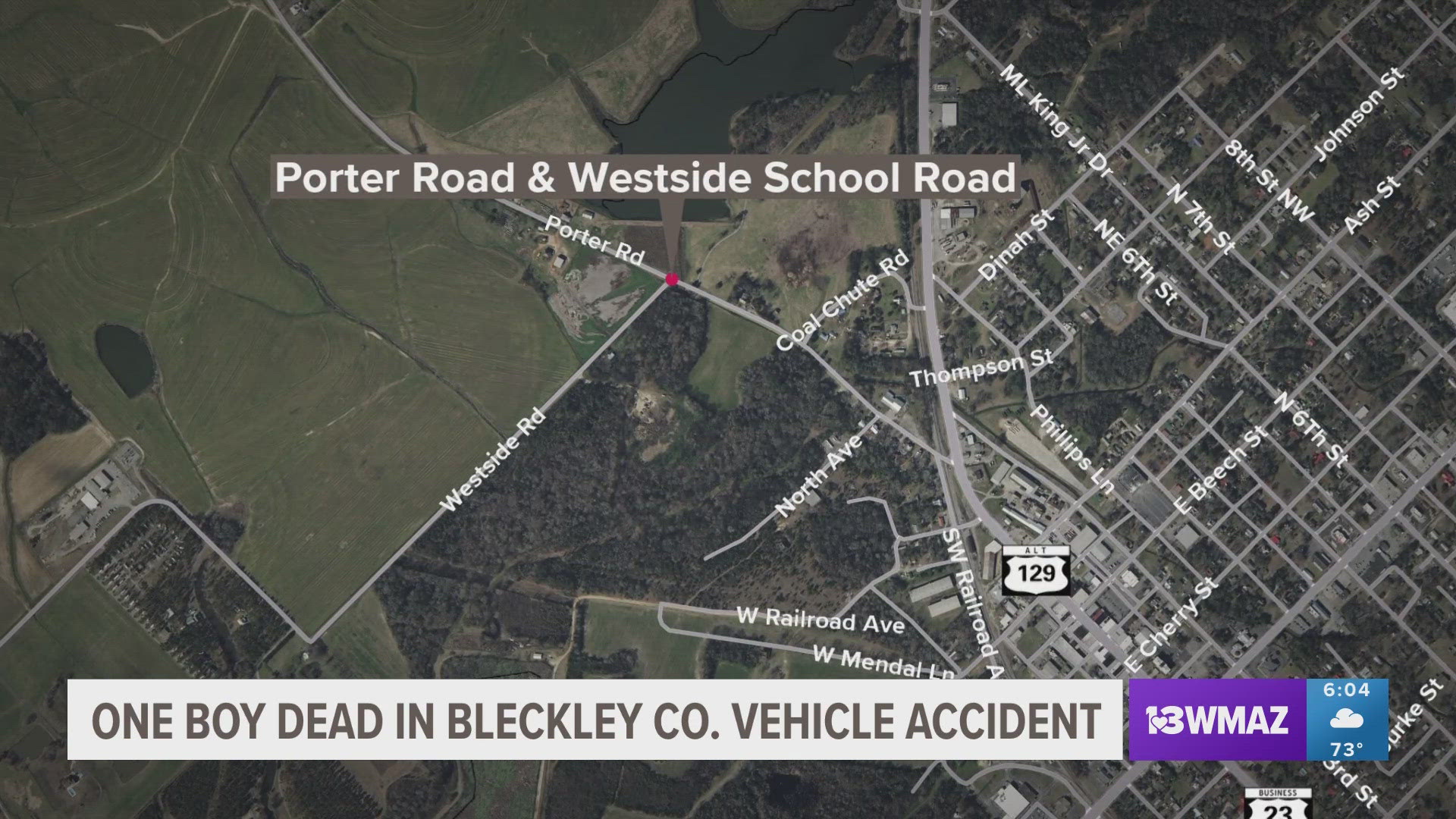![Supreme Court: Boone is Gordon city attorney[ID=29487871] ID=29487871](http://wmaz-download.edgesuite.net/video/29487871/29487871_Still.jpg) Georgia's Supreme Court says the mayor of Gordon had no right to hire a new city attorney, after some city council members tried to fire the previous one.
Georgia's Supreme Court says the mayor of Gordon had no right to hire a new city attorney, after some city council members tried to fire the previous one.
This was the second time this month the court ruled on Gordon politics and Mayor Mary Ann Whipple-Lue.
Today's ruling says last year's vote to fire City Attorney Joseph Boone, who held the job for 35 years, was invalid.
The state court says Whipple Lue could not take part in that vote.
So the next vote, to hire Ronny Jones as interim attorney, was also not legal, the board said.
Boone challenged his firing in court and Monday's ruling apparently reinstates him as the city's attorney.
His law partner, James Green, represented Boone.
He argued that the abstained vote should not have been counted negative.
That means there was no tie vote, and that Mayor Whipple-Lue shouldn't have voted.
"Council Members usually recuse themselves if there's a sewer project or something coming down their street. They'll say, 'I recuse myself from this vote,'" said Green, "In this case they abstained. It's the same language they intend to recuse themselves from the vote and not be part of the vote."
Boone says he's just happy to get back to work.
"As far as I'm concerned, it's business as usual. I'm not doing anything different than I did for any other mayor or council," he said.
13WMAZ reached out to Ronny Jones, Whipple-Lue's choice for interim city attorney.
He said he needed to review the decision before he could comment.
Whipple-Lue has battled with her critics in town since taking office in early 2014.
Opponents accuse her of mishandling city money and personnel records and holding illegal meetings. Whipple-Lue says she's done nothing wrong and that she's been targeted because she's a black woman.
Last year, a judge suspended her from office and then reinstated her, with conditions. Earlier this month, the Georgia Supreme Court said she could remain in office, but her opponents' lawsuit aimed at removing her could proceed in court.
Here is the court's statement on the ruling:
JONES V. BOONE (S15A0521)
The Supreme Court of Georgia has unanimously ruled that Mayor Mary Ann Whipple Lue of Gordon, GA did not have the authority to appoint a new city attorney following a vote to fire the man who had held the position for more than 35 years.
Today's decision in this locally high-profile Wilkinson County case is the second this month issued by the Georgia Supreme Court in a case involving a contentious dispute over several actions Lue has taken since becoming mayor last year.
According to the Gordon City Charter, the local government's authority "shall be vested in a city council to be composed of a mayor and six council members." The mayor has the power to "appoint and remove, for cause," all officers, department heads, and employees of the city "with confirmation of appointment or removal by the council." The City Charter states that "the affirmative vote of four councilmembers shall be required for the adoption of any ordinance, resolution, or motion." The mayor is permitted to vote in the case of a tie. At a May 21, 2014 city council meeting, Lue made a motion to remove Joseph A. Boone, who had served as city attorney for several decades. Three city council members voted in favor of the motion, two against, and one abstained. After determining she had a vote because the abstention counted as a negative vote, the mayor voted in favor of terminating Boone, bringing the vote to the four affirmative votes required by the City Charter. Subsequently there was a motion to give the mayor the authority to appoint an interim attorney, and the vote was the same: three in favor, two against, and one abstention. Again the mayor determined she had a vote and cast a yes. The next day, the mayor sent out a letter announcing the appointment of Ronny E. Jones as the new interim city attorney.
In September 2014, Boone sued, filing a petition for what is called a "writ of quo warranto," which is used to challenge an individual's right to hold a public office. Boone argued he was still city attorney because Jones was never confirmed by the city council as required by the City Charter and the mayor did not have the authority to vote because there was no tie. Jones responded that
Boone was no longer city attorney as he had resigned from that position at the May 21, 2014 city council meeting when he was voted out of office. Following a hearing, the Jasper County trial judge ruled in favor of Boone, finding that Jones "is not the appropriately appointed city attorney of Gordon, Georgia." The judge ruled that the question of whether Jones appropriately holds the appointment of city attorney "is a question of law and, therefore, a jury trial is not required under the laws of the State of Georgia." And, the judge stated: "It is the finding of this court that the city attorney serves at the pleasure of the city council and the mayor's vote was used inappropriately and was not valid under the Code of the City of Gordon." Because the judge determined Lue did not have the power to appoint Jones as city attorney, he granted Boone's petition for a writ of quo warranto.
In today's decision, Justice Carol Hunstein writes that "we affirm the order granting the writ of quo warranto," and "we find no authority permitting the mayor to count the council member's abstention from voting as a negative vote, thereby creating a tie."
In its 2007 decision in Merry v. Williams, the Georgia Supreme Court ruled that the requirement of a specific number of affirmative votes exhibits a legislative intent that abstentions not be counted with the majority of votes cast. The high court further determined they could not be counted as negative votes. While Jones argued in his appeal that the mayor had the authority to treat an abstention as a negative vote, he "cites no act, law, charter provision, or rule of procedure granting either the mayor or the city council such authority," today's opinion says.
"Accordingly, in the absence of any clear statutory, charter provision, or rule of procedure authorizing the mayor to treat an abstention as an actual vote by a council member, either in the affirmative or negative, we hold that the council member's abstention from voting on the May 21, 2014 motion to delegate to the mayor the power to appoint a city attorney was, in fact, no vote at all. Therefore, there was no tie vote on the motion and Mayor Lue was not authorized to cast a vote in its favor. The sole authority to appoint a city attorney thus remained in the city council." The Court finds no merit in Jones' other challenges.
Attorney for Appellant (Jones): Ronny Jones, pro se
Attorney for Appellee (Boone): James Green



